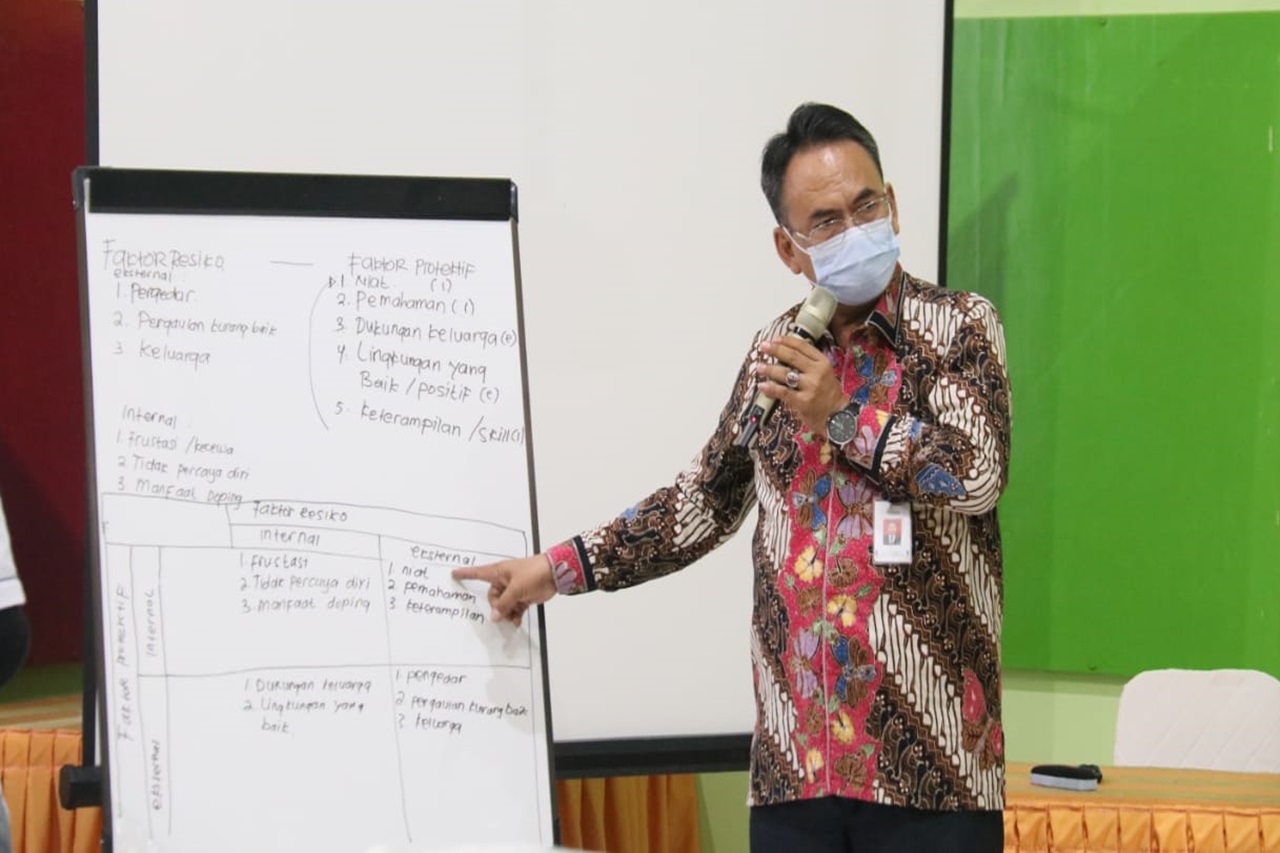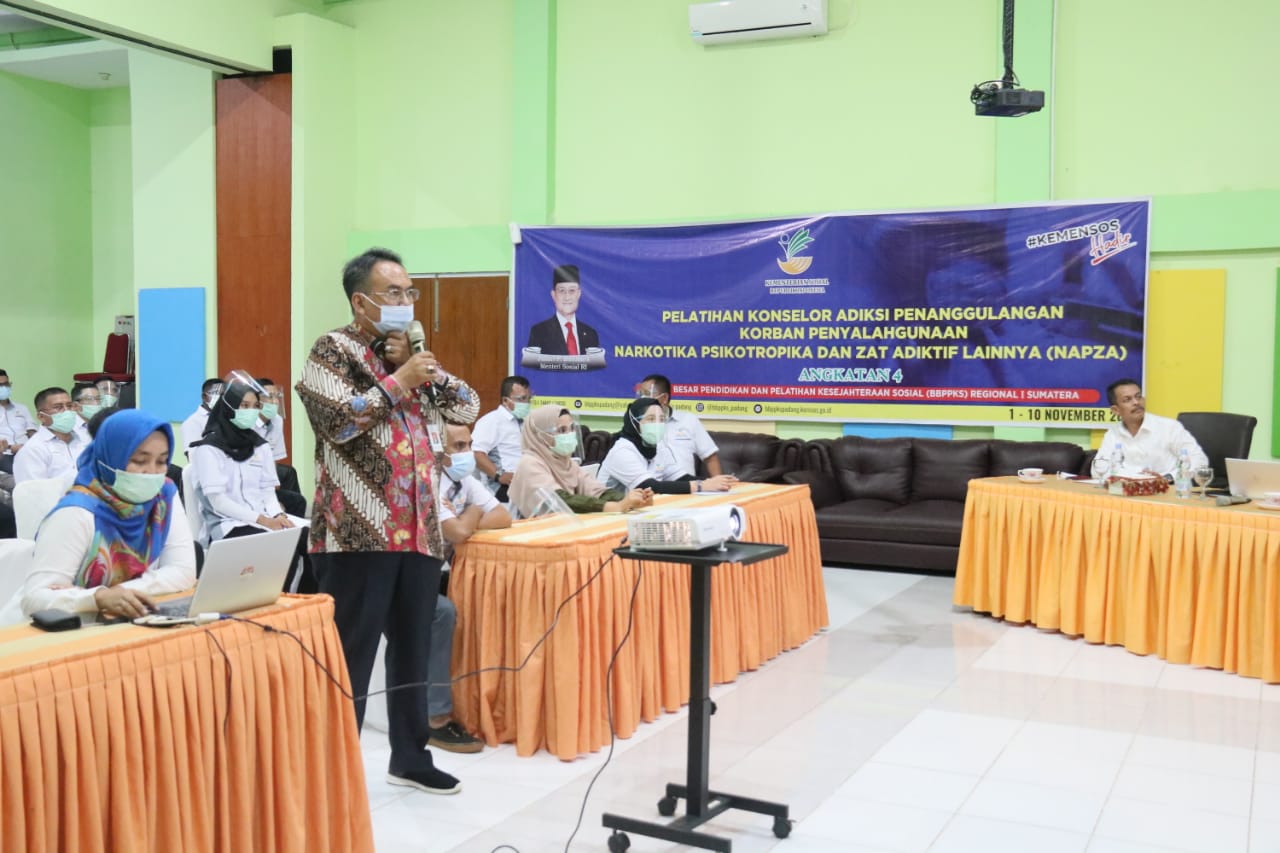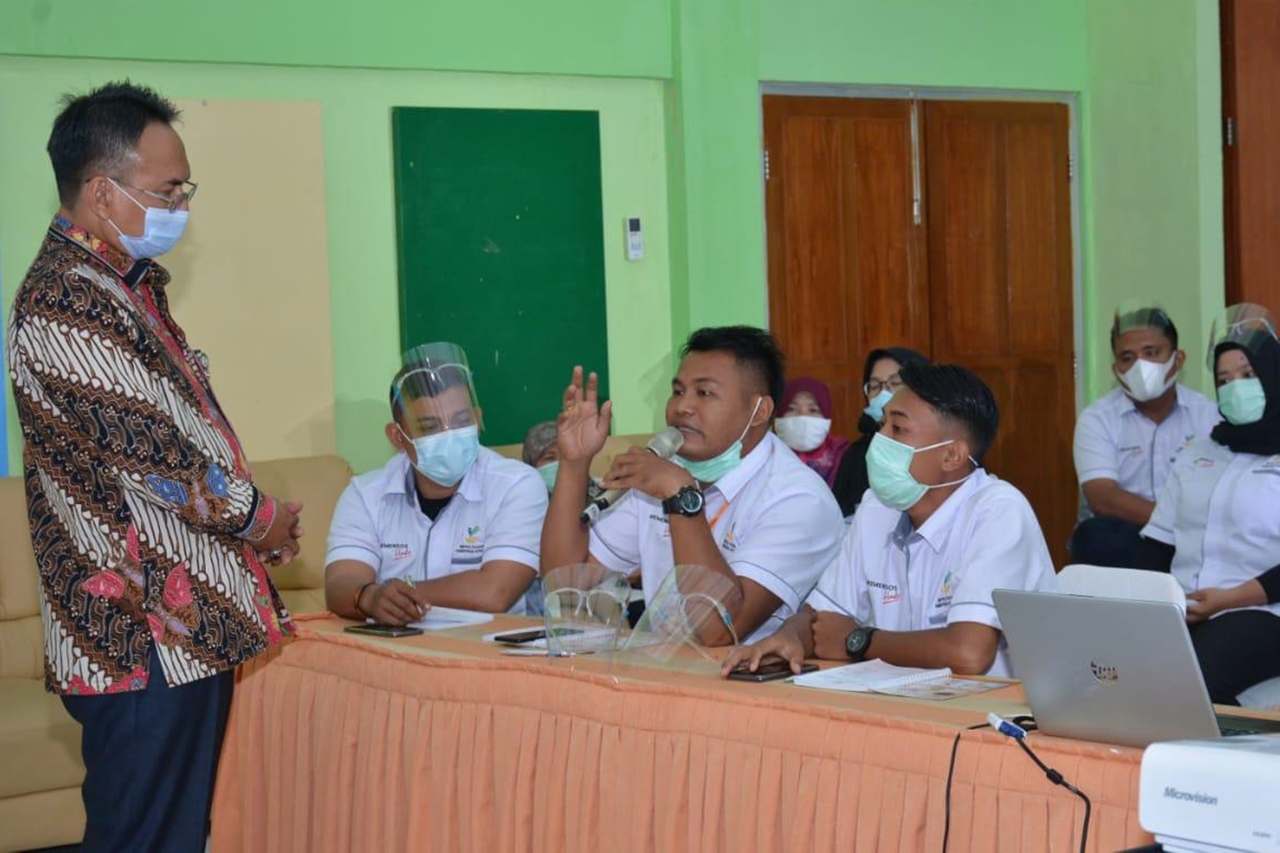Writer :
OHH Ditjen Rehsos
Editor :
Annisa YH
Translator :
Intan Qonita N
PADANG (November 2, 2020) - The Ministry of Social Affairs through the Directorate General of Social Rehabilitation is committed to ensuring that there are policies that support efforts to suppress harm reduction that is stronger than demand reduction for Substance Use Disorders (GPZ)/Drug Abuse Victims. This was conveyed by the Director General of Social Rehabilitation Harry Hikmat during the Addiction Counselor Training for Victims of Abuse of Narcotics, Psychotropics and Other Addictive Substances (NAPZA) organized by the Padang Center for Social Welfare Education and Training (BBPPKS).
"There is a need for more intensive socialization about the adverse effects of using drugs, rather than expanding legal/criminal actions and requiring a stricter monitoring system," said Harry. Reducing this adverse impact is a paradigm shift in policy making, which was originally dominated by repressive criminal law actions to increase public awareness programs about the health and social impacts of former victims of drug abuse.
“This is what makes the Social Rehabilitation Assistance (ATENSI) program different from the roles of the Center and Balai. The center talks about how social rehabilitation is carried out for drug victims, while at Balai there is an intensive and massive campaign about the dangers of drug abuse," explained Harry.
The next paradigm shift in drug handling is from the criminal justice system to treatment. The point is social and medical rehabilitation. The application of criminal law and the like unconsciously has the implication of forming an exclusive use of drugs which on the other hand has an impact on the difficulty of social and medical rehabilitation programs in reaching drug users themselves.
"We put forward a social rehabilitation approach as the main force in suppressing the adverse effects of drug abuse," said Harry. The Ministry of Social Affairs has a mandate from Law Number 35 of 2009 concerning Narcotics that narcotics addicts and victims of narcotics abuse are required to undergo medical rehabilitation and social rehabilitation.
Harry said that the purpose of Social Rehabilitation for Victims of Drug Abuse (KPN) is so that KPN is able to carry out its social functions which include the ability to carry out roles, meet needs, solve problems and self-actualization, and create a social environment that supports the success of KPN Social Rehabilitation and does not relapse. Rehabilitation is carried out in institutions appointed by the Government to receive treatment and/or treatment through medical rehabilitation and social rehabilitation.
"There is a need for more intensive socialization about the adverse effects of using drugs, rather than expanding legal/criminal actions and requiring a stricter monitoring system," said Harry. Reducing this adverse impact is a paradigm shift in policy making, which was originally dominated by repressive criminal law actions to increase public awareness programs about the health and social impacts of former victims of drug abuse.
“This is what makes the Social Rehabilitation Assistance (ATENSI) program different from the roles of the Center and Balai. The center talks about how social rehabilitation is carried out for drug victims, while at Balai there is an intensive and massive campaign about the dangers of drug abuse," explained Harry.
The next paradigm shift in drug handling is from the criminal justice system to treatment. The point is social and medical rehabilitation. The application of criminal law and the like unconsciously has the implication of forming an exclusive use of drugs which on the other hand has an impact on the difficulty of social and medical rehabilitation programs in reaching drug users themselves.
"We put forward a social rehabilitation approach as the main force in suppressing the adverse effects of drug abuse," said Harry. The Ministry of Social Affairs has a mandate from Law Number 35 of 2009 concerning Narcotics that narcotics addicts and victims of narcotics abuse are required to undergo medical rehabilitation and social rehabilitation.
Harry said that the purpose of Social Rehabilitation for Victims of Drug Abuse (KPN) is so that KPN is able to carry out its social functions which include the ability to carry out roles, meet needs, solve problems and self-actualization, and create a social environment that supports the success of KPN Social Rehabilitation and does not relapse. Rehabilitation is carried out in institutions appointed by the Government to receive treatment and/or treatment through medical rehabilitation and social rehabilitation.
A change in approach is urgently needed to start treating drug use as a health problem and not a criminal offence. Dependence recovery (social rehabilitation) is a more effective policy for addicts who are not involved in violent crimes. Imprisonment must be maintained or used only as an option for perpetrators of serious criminal offenses.
Imprisonment as a punishment should be applied to perpetrators of serious drug crimes and/or perpetrators of violent drug crimes. Application of depenalization or decriminalization as an alternative for drug users and drug retailers.
Harry said that the Ministry of Social Affairs was building a social rehabilitation system that prioritizes respect, protection and fulfillment of the rights of victims of drug abuse, strengthening the integrated social rehabilitation system with social security, social empowerment and social protection for beneficiaries, expanding the reach of social rehabilitation for family-based beneficiaries, community and residential.
“This social rehabilitation system does not have a single approach, but must be integrated with social protection, social security including health insurance, family based, community. The Addiction Counselor is the spearhead to carry out family and community-based Social Rehabilitation, as well as a network for residential or Balai-based social rehabilitation," said Harry.
"I emphasize to check family and environment of each individual victim as our efforts to strengthen the protective factor. Actualize the power of each individual, do not work only from one individual to another, but working with individuals, families and their environment," said Harry.
Harry also hopes that addiction counselors will master and understand the Therapeutic Community (TC) and adapt TC to the local environment. TC is a social rehabilitation method aimed at drug abusers who are a "family" consisting of people who have the same problems and goals, namely to help themselves and others led by someone from them so that there is a change in behavior from negative to negative. positive direction. Within the TC there are efforts to make KPN not relapse. TC is the main force in the Ministry of Social Affairs' Center for the Rehabilitation of Drug Abuse Victims.
The Ministry of Social Affairs suggest Addiction Counselors to speak about the bad effects of drugs. In the future, the Addiction Counselor will become a strong network for the Ministry of Social Affairs, not only providing counseling, but also being involved in various efforts that lead to social movements in the broader community.
Imprisonment as a punishment should be applied to perpetrators of serious drug crimes and/or perpetrators of violent drug crimes. Application of depenalization or decriminalization as an alternative for drug users and drug retailers.
Harry said that the Ministry of Social Affairs was building a social rehabilitation system that prioritizes respect, protection and fulfillment of the rights of victims of drug abuse, strengthening the integrated social rehabilitation system with social security, social empowerment and social protection for beneficiaries, expanding the reach of social rehabilitation for family-based beneficiaries, community and residential.
“This social rehabilitation system does not have a single approach, but must be integrated with social protection, social security including health insurance, family based, community. The Addiction Counselor is the spearhead to carry out family and community-based Social Rehabilitation, as well as a network for residential or Balai-based social rehabilitation," said Harry.
"I emphasize to check family and environment of each individual victim as our efforts to strengthen the protective factor. Actualize the power of each individual, do not work only from one individual to another, but working with individuals, families and their environment," said Harry.
Harry also hopes that addiction counselors will master and understand the Therapeutic Community (TC) and adapt TC to the local environment. TC is a social rehabilitation method aimed at drug abusers who are a "family" consisting of people who have the same problems and goals, namely to help themselves and others led by someone from them so that there is a change in behavior from negative to negative. positive direction. Within the TC there are efforts to make KPN not relapse. TC is the main force in the Ministry of Social Affairs' Center for the Rehabilitation of Drug Abuse Victims.
The Ministry of Social Affairs suggest Addiction Counselors to speak about the bad effects of drugs. In the future, the Addiction Counselor will become a strong network for the Ministry of Social Affairs, not only providing counseling, but also being involved in various efforts that lead to social movements in the broader community.
Share :
 English
English
 Bahasa
Bahasa



